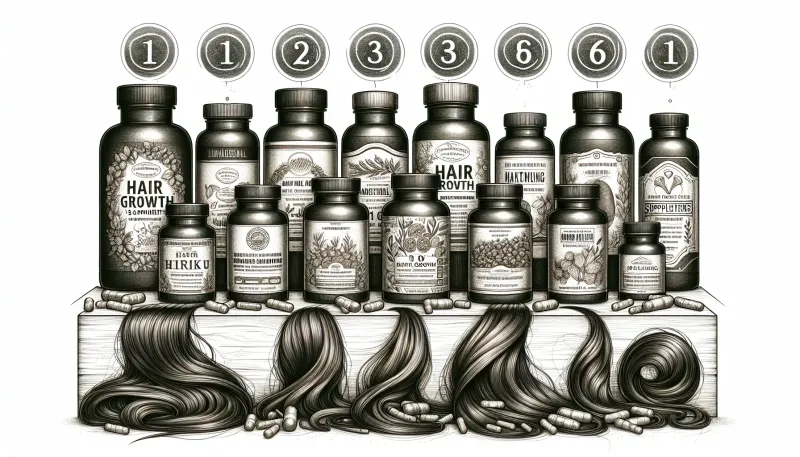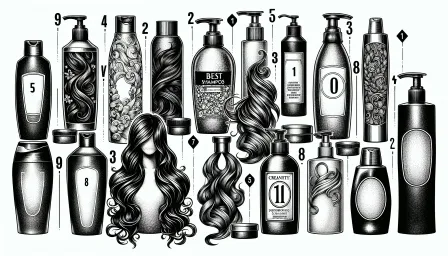Top 10 Hair Growth Vitamins and Supplements for Thicker, Healthier Hair

Discover the top 10 hair growth vitamins and supplements that can help you achieve thicker, healthier hair. Learn about their benefits, sources, and how they can support your hair health journey.
In pursuit of luscious locks and healthier hair, many turn to hair growth vitamins and supplements. Incorporating these nutrients can make a significant difference in hair strength, thickness, and overall health. This article explores the top 10 vitamins and supplements known to support hair growth by providing essential nutrients your hair needs to thrive.
1. Biotin (Vitamin B7)
Biotin, or Vitamin B7, is a water-soluble vitamin crucial for healthy hair growth. It plays a vital role in the production of keratin, a protein that forms the structure of hair. A deficiency in biotin can lead to hair thinning and loss.
Sources: Eggs, nuts, seeds, salmon, avocados, and sweet potatoes. You can also find biotin in supplement form.
2. Vitamin D
Vitamin D is essential for hair follicle cycling and may help stimulate hair growth. Low levels of Vitamin D have been linked to hair loss conditions like alopecia.
Sources: Sun exposure, fatty fish, beef liver, cheese, and fortified foods. Supplements are also available for those with difficulty getting enough from diet and sun.
3. Vitamin E
Vitamin E is known for its antioxidant properties which help protect hair cells from damage. It also promotes a healthy scalp by improving blood circulation.
Sources: Sunflower seeds, almonds, spinach, and avocados. Vitamin E supplements can also be beneficial.
4. Iron
Iron deficiency is a common cause of hair loss, especially in women. Iron helps red blood cells carry oxygen to your cells, including hair follicles, which is necessary for growth.
Sources: Red meat, beans, lentils, spinach, and tofu. Iron supplements may be required in some cases.
5. Zinc
Zinc plays a critical role in hair tissue growth and repair. It also helps maintain the oil glands around the follicles, preventing dryness and dandruff.
Sources: Oysters, beef, pumpkin seeds, and lentils. Zinc supplements can provide additional support if needed.
6. Omega-3 Fatty Acids
Omega-3 fatty acids are known for their anti-inflammatory properties, which can help open hair follicles and promote hair growth. They also help keep the scalp hydrated.
Sources: Fatty fish like salmon, mackerel, and sardines, as well as flaxseeds, chia seeds, and walnuts. Omega-3 supplements, such as fish oil, are popular options.
7. Vitamin A
Vitamin A is necessary for cell growth, including hair cells. It helps the skin glands produce sebum, which keeps hair moisturized and healthy.
Sources: Sweet potatoes, carrots, spinach, and kale. Vitamin A supplements can ensure adequate intake.
8. Vitamin C
Vitamin C is essential for the production of collagen, an important part of the hair structure. It also helps the body absorb iron, which is vital for hair growth.
Sources: Citrus fruits, strawberries, bell peppers, and broccoli. Vitamin C supplements are widely available.
9. Protein
Hair is primarily made up of protein, making it crucial for hair health. Protein deficiency can lead to weak or brittle hair.
Sources: Eggs, poultry, fish, and legumes. Protein supplements, such as whey protein, can be beneficial for those with increased protein requirements.
10. Collagen
Collagen is a protein that helps strengthen hair and improve elasticity. It also fights damage to hair follicles caused by free radicals.
Sources: Bone broth, chicken skin, fish skin, and collagen supplements, typically available in powder or capsule form.
Conclusion
Incorporating hair growth vitamins and supplements into your diet can significantly impact the health and appearance of your hair. By ensuring you receive adequate amounts of these essential nutrients, you can support hair growth, reduce hair loss, and maintain overall hair health. Always consider consulting with a healthcare provider before starting any supplement regimen to address your specific needs and avoid potential side effects.



























